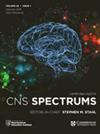The four principles of bioethics in cases of Anosognosia.
IF 4.1
3区 医学
Q2 CLINICAL NEUROLOGY
引用次数: 0
Abstract
Anosognosia, a term that denotes a lack of insight into one's own condition, is a defining characteristic of many psychotic illnesses. As a result, generations of psychiatrists have pursued a paternalistic approach to care. Yet in the past century, the overall trend in patient care has been toward autonomy. What does it mean to respect the autonomy of patients whose lack of insight may bring them harm? This chapter will explore these questions through each of the four principles generally employed in bioethical analysis: beneficence, nonmaleficence, justice, and autonomy. Each will have an illustrative case study and explore how anosognosia can further complicate already perplexing ethical scenarios.
病感失认症的四项生命伦理原则。
病感失认症(Anosognosia)是指对自身状况缺乏洞察力的一个术语,是许多精神疾病的典型特征。结果,一代又一代的精神科医生都奉行家长式的治疗方法。然而,在过去的一个世纪里,病人护理的总体趋势是走向自主。病人缺乏洞察力可能会给他们带来伤害,尊重病人的自主权意味着什么?本章将通过生物伦理学分析中通常采用的四个原则中的每一个来探讨这些问题:有益、无害、正义和自主。每个都将有一个说明性的案例研究,并探讨病感失认症如何进一步复杂化已经令人困惑的伦理场景。
本文章由计算机程序翻译,如有差异,请以英文原文为准。
求助全文
约1分钟内获得全文
求助全文
来源期刊

CNS Spectrums
医学-精神病学
CiteScore
6.20
自引率
6.10%
发文量
239
审稿时长
>12 weeks
期刊介绍:
CNS Spectrums covers all aspects of the clinical neurosciences, neurotherapeutics, and neuropsychopharmacology, particularly those pertinent to the clinician and clinical investigator. The journal features focused, in-depth reviews, perspectives, and original research articles. New therapeutics of all types in psychiatry, mental health, and neurology are emphasized, especially first in man studies, proof of concept studies, and translational basic neuroscience studies. Subject coverage spans the full spectrum of neuropsychiatry, focusing on those crossing traditional boundaries between neurology and psychiatry.
 求助内容:
求助内容: 应助结果提醒方式:
应助结果提醒方式:


